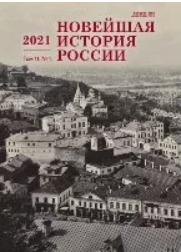Interpreting Eisenstein’s Ivan the Terrible
Interpreting Eisenstein’s Ivan the Terrible
Author(s): David BrandenbergerSubject(s): Review, Political history, Film / Cinema / Cinematography, History of Art, American Literature
Published by: Издательство Исторического факультета СПбГУ
Keywords: Eisenstein; Ivan the Terrible; Stalin; homoeroticism; homophobia; Zhdanov;
Summary/Abstract: This critical analysis of Joan Neuberger’s book This Thing of Darkness (Cornell University Press, 2019) hails the monograph for its exhaustive research and thorough analysis. Eisenstein stands out in the pages of This Thing of Darkness as the quintessential non-conformist — an exception to everything we know about Soviet subjectivity. Neuberger argues that the question of whether Eisenstein was pro-Soviet or anti-Soviet is effectively a reductionist dead end. Eisenstein, she suggests, was an exception — someone who defied categorization, whether by his cinematographer contemporaries or by Stalin himself, for that matter. The article contends that Neuberger’s reading of Eisenstein as an imaginative, stubborn, risk-taking and subversive director challenges recent scholarship on the restrictive nature of Stalinist subjectivity. The author also investigates Neuberger’s contention that Stalin banned the second part of Ivan the Terrible in part because of the film’s homoeroticism by reexamining the fragmentary historical record. In so far as there is no reason to think that Stalin would have hesitated to articulate to Zhdanov or to Eisenstein and Cherkasov any specific objections he had to the film’s homoeroticism, the author suspects that the best explanation for the dictator’s banning of the film remains the historical license that Eisenstein took with the official Stalinist line on the terrible tsar.
Journal: Новейшая история России
- Issue Year: 11/2021
- Issue No: 34
- Page Range: 222-229
- Page Count: 8
- Language: English

